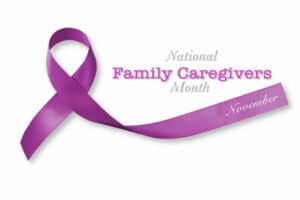 The Alzheimer’s Association has set November as National Family Caregivers Month. While Alzheimer’s Disease and dementia affect the diagnosed individual, this disease can cause turmoil for the family, as well. Unlike many other diseases, the stress on caregivers dealing with memory loss can become difficult to manage, particularly if your loved one no longer remembers you or becomes combative. Today we’d like to focus on Alzheimer’s Caregiving, both for you and your loved one.
The Alzheimer’s Association has set November as National Family Caregivers Month. While Alzheimer’s Disease and dementia affect the diagnosed individual, this disease can cause turmoil for the family, as well. Unlike many other diseases, the stress on caregivers dealing with memory loss can become difficult to manage, particularly if your loved one no longer remembers you or becomes combative. Today we’d like to focus on Alzheimer’s Caregiving, both for you and your loved one.
Alzheimer’s Caregiving and Covid-19
While we have focused on help for caregivers before, the current pandemic raises a whole new level of concern. The Coronavirus has added a new layer of stress for everyone, regardless of situation. Us Against Alzheimer’s reports that these effects have been worse for those with dementia and the caregiving community. Check out these stats from their site:
Nearly 9 in 10 (88 percent) of caregivers reported having one or more stress symptoms typically found in people experiencing severe stress – an 8-point jump from April. The top reported stress symptoms included: sleep problems (38 percent); difficulty concentrating (34 percent); trouble experiencing positive feelings (31 percent); loss of interest in activities (31 percent); vigilance/being ‘super alert’ (29 percent); and irritable/angry behavior (25 percent).
Families of those in long term care see effects, as well. Since most nursing homes have restricted or eliminated visitation, loved ones can only visit by phone or video chat. Many worry about or have seen decline in cognitive abilities without normal human interaction. In many cases, lack of contact with loved ones has accelerated this decline. Consequently, this adds to the stress of those who worry for their loved ones.
What’s a Caregiver to Do?
Alzheimer’s caregiving during a pandemic can feel hopeless, especially with no end in sight. You work hard to protect your loved one, but you need to care for yourself, as well. Here are some tips:
Find a Way to Relieve Stress
Yes, you’re stuck at home most of the time. Yes, that’s a drag. There are, however, ways to reduce stress in this situation. Many yoga studios offer online video classes for meditation and stress relief. If you can’t afford a class, go to YouTube and search for meditation playlists.
If meditation doesn’t do it for you, focus on a hobby or something that brings you joy.
Stay in Touch with Friends
Whether it’s through social media, phone calls, text, or video chat, make sure you stay connected. Direct contact may be a better plan than social media. Sometimes scrolling your news feed during times of turmoil can cause undue stress.
Use an Online Counselor
Recognize when you need to talk to somebody. Most counselors have adapted to the times and will meet via video chat. If your employer or benefits provider has an EAP program, you can possibly get counseling services at no charge.
Find a Virtual/Online Support Group for Alzheimer’s Caregiving
The Alzheimer’s Association has their own virtual community, both for those who have the disease or care for those who do. There you can find message boards, articles, and all kinds of resources for Alzheimer’s caregiving. In Central Virginia, they offer events and support that you can access online, without risk of infection.
Use Respite Care
Finally, recognize when you need a break. Getting out of the house for even a couple of hours can be balm for a caregiver’s weary soul. Understandably, you may have concerns about getting respite care during a pandemic. When you call, ask the provider about COVID protocols. If you don’t like their answer, you don’t have to use them! Here at Seniors Helping Seniors Greater Richmond, our providers answer 5 health protocol and exposure questions before reporting to work. In addition, they wear masks at all times, wash hands before and after each task, and keep socially distanced whenever possible.
Yes, it feels overwhelming to care for a loved one with Alzheimer’s or dementia, but we are eager to help in any way we can!


